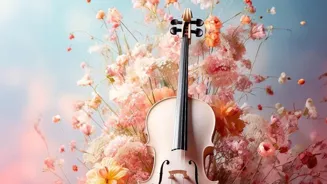Unlock the Healing Power of Music: Explore 10 Insights on Music Therapy. Discover how melodies mend minds and bodies
In a country where Bollywood tunes are practically a second language and classical ragas
resonate in our souls, it’s no surprise that music therapy is gaining traction as a powerful healing tool.

Forget just humming along to your favourite song – this is about harnessing the therapeutic potential of music to improve mental, emotional, and even physical well-being. From bustling city hospitals to serene rehabilitation centres, music therapy is making waves. Let's explore ten fascinating insights into how music is being used to mend minds and bodies:
Taming the Anxious Mind: Music's Soothing Symphony
In today's fast-paced world, anxiety has become as common as chai breaks. But what if the cure was as simple as tuning into the right melody? Music therapy offers a non-invasive, enjoyable way to manage anxiety.

Therapists use techniques like rhythmic entrainment – prompting the brain to sync with a steady beat – to calm racing thoughts. Think of it as a mental massage, easing the tension and promoting relaxation. Patients often report feeling less stressed and more grounded after sessions.
It’s like finding your inner peace through the perfect playlist.
Boosting Brainpower: Music for Cognitive Enhancement
Who knew your favourite tunes could sharpen your mind? Music therapy is proving its worth in cognitive rehabilitation, especially for individuals recovering from strokes, brain injuries, or dealing with neurodegenerative conditions.

Listening to music can stimulate different areas of the brain, improving memory, attention span, and language skills. Playing an instrument further enhances these benefits, engaging motor skills and coordination. Forget Sudoku, maybe a little sitar practice is the way forward!
It provides a holistic approach to brain training.
Easing the Pain: A Melodic Antidote
Chronic pain can be debilitating, casting a long shadow over daily life. Music therapy provides a welcome distraction and more. Studies show that listening to music can release endorphins, the body's natural painkillers.

It can also help patients manage their perception of pain, making it more bearable. During sessions, patients might engage in guided imagery with music, creating a soothing mental landscape that diminishes the focus on discomfort.
By shifting energy away from pain with uplifting music, the mind is soothed.
Connecting Through Sound: Music for Social Interaction
For individuals facing social isolation or communication challenges, music can be a bridge to connect with others. Group music therapy sessions provide a safe and supportive environment for individuals to express themselves and build relationships.
Whether it's singing together, playing instruments, or simply listening as a group, music fosters a sense of belonging and shared experience. It can be particularly beneficial for children with autism spectrum disorder or adults with social anxiety.
Expressing Emotions: A Song in Your Heart
Sometimes, words fail us. Music therapy offers an alternative outlet for expressing feelings that are difficult to articulate. Through songwriting, improvisation, or simply listening to evocative pieces, individuals can explore and process their emotions in a safe and non-judgmental space.

It can be especially helpful for those dealing with grief, trauma, or emotional distress. It's like finding a voice within the melody, and making it audible.
Aiding Recovery: Helping the Body with Harmony
Music therapy isn't just for the mind; its good for the body too. Studies have demonstrated that listening to music may help reduce heart rate, lower blood pressure, and help improve breathing. It has been effectively used in cardiac rehabilitation programs to help patients recover faster.

The impact of carefully selected music has shown how much it can aid a patient with recovery. Regular sessions have shown that it encourages both emotional and physical healing.
Music therapy sessions may consist of various activities which are designed to make them better such as listening in and actively participating in music creation. Music therapists may utilise guided imagery which has the client visualize positive and soothing images to enhance their emotions.
Improvisation is also widely used, which encourage them to express themselves spontaneously. Song writing has them come up with the melody that they create and listen during tough times. Music discussion helps people to understand the music from theoretical viewpoint.
In India, music finds wide variety of applications. In mental health settings, it helps tackle depression, anxiety and PTSD by providing emotional relief and enhancing mood.
In speciality situations like geriatrics, it has a huge role to play in soothing dementia symptoms and providing a relaxed state of mind by improved mental stimulation. It promotes physical therapy through rhythmic exercises to promote the mobility and the ability of coordination.
In cancer patients it gives emotional support by minimizing the burden of the treatments.
The benefits of music therapy are endless, however patients need to know that the therapy would happen over time. Each patient will have their own individual journey.
It may be necessary to consult professionals for the most accurate treatment. Integration of music treatment can be incorporated with different medical interventions such as medicine and cognitive behavioural therapy so that the benefits from multiple methods are maximised.
The integration into various settings can make the advantages accessible to the masses.
Music therapy has become a well known approach in India for supporting both emotional and physical recovery by the method used to relieve the symptoms from pain and stress.
These have greatly become a part of the community for well being. It has now opened the door to potential avenues for research so that it enhances the clinical practices and gives greater opportunity for the well being of patients throughout the diverse cultures.
With the recognition in research and the funding available it is possible for the therapy to make its way to different people in society. By combining the rich musical legacy and the new discoveries, India is set to make path to the therapeutic benefits of music across a wide community.












